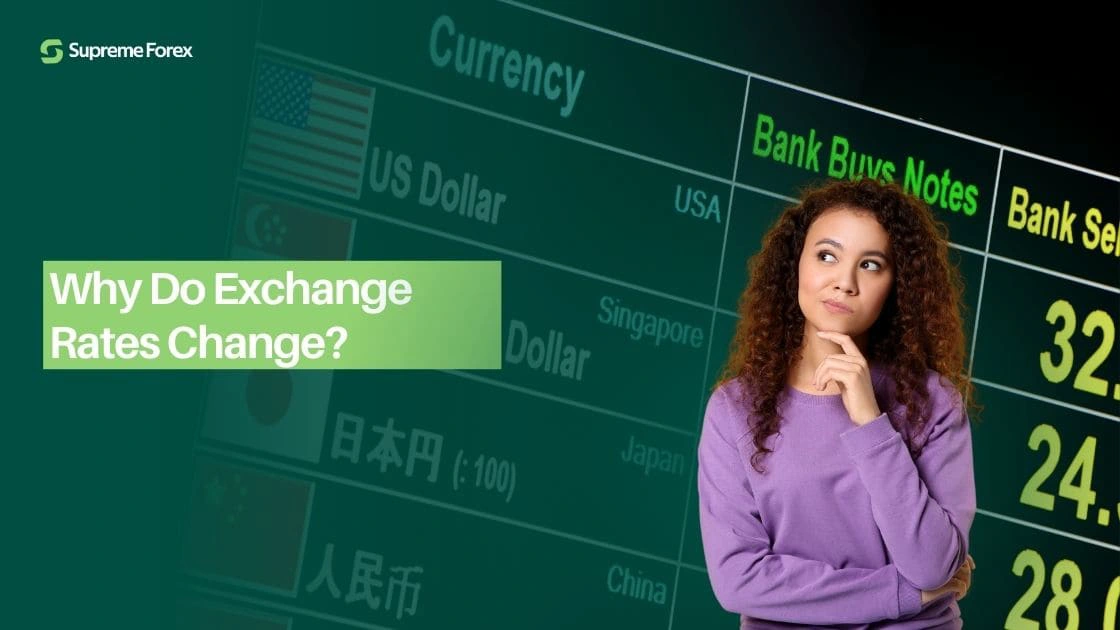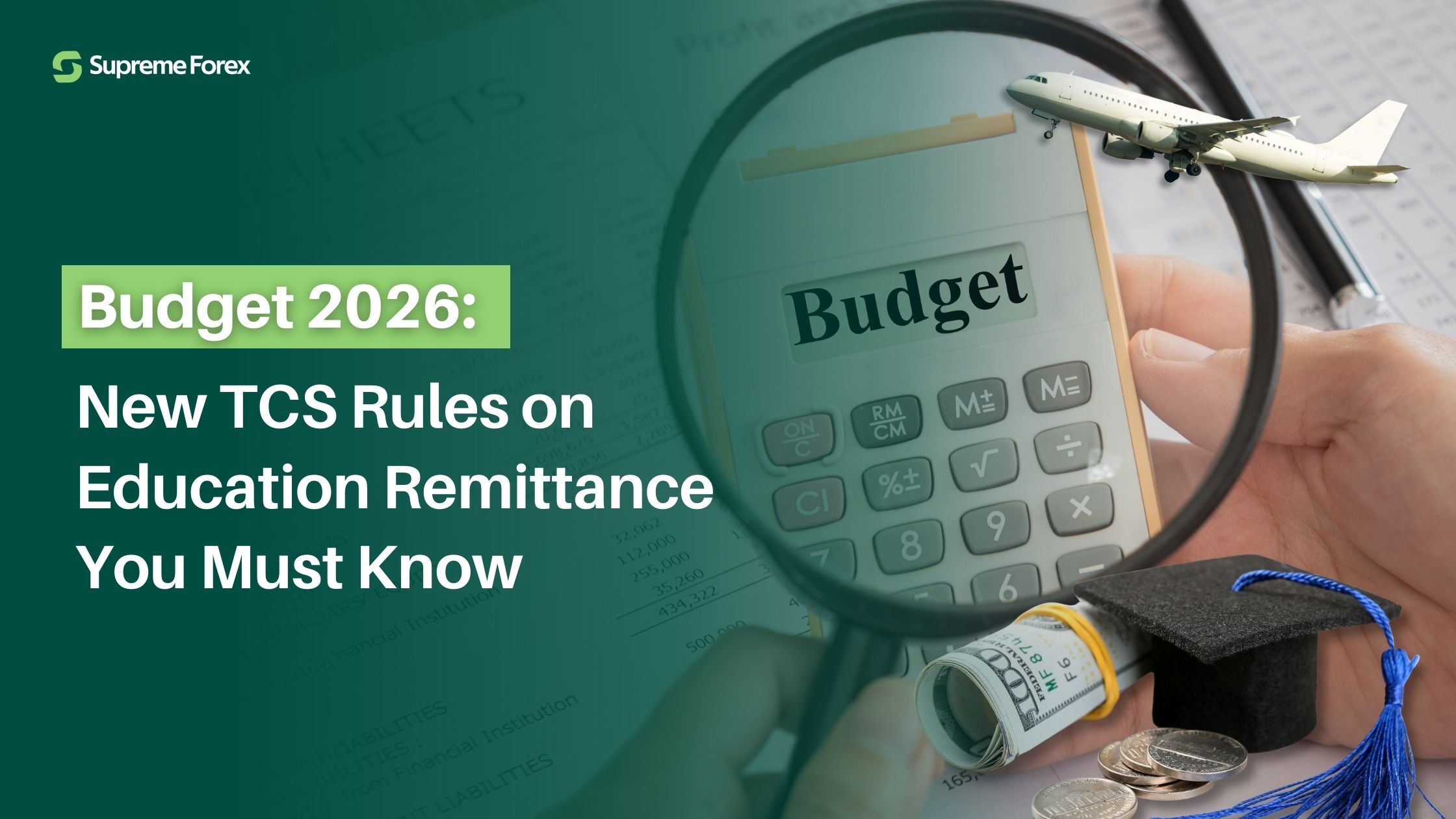The very first thing you’ll likely notice while planning a trip or studying abroad is the frequent exchange rate changes. These shifts, whether minor or significant, can drastically impact how you estimate your travel or education budget. But what causes these fluctuations? It all comes down to various factors affecting exchange rate movements, including inflation, interest rates, political stability, global economic performance, foreign investment trends, and even speculation in the forex markets.
Table of contents
Factors affecting exchange rate
Economic Factors
1. Inflation Rates
Inflation is one of the most basic factors affecting exchange rate. Inflation is defined as the rate at which the general level of prices of goods and services is rising. Rise of price consequently leads to erosion of the purchasing power of currency. Countries experiencing lower inflation will often cause appreciation of their currency against others. For example, if India’s inflation is lesser than that of the U.S., INR may appreciate against the USD.
2. Interest Rates
The interest rates, however, defined by a country’s central bank is another key point. Higher interest rates give a better return to lenders in an economy compared to other countries. Therefore, it attracts foreign investment with higher interest rates. This in turn appreciates the currency value. Suppose the Reserve Bank of India hikes interest rates. Foreign investors may be attracted towards INR-denominated assets. And the demand for INR would rise.
3. Economic Growth
Countries with robust and stable economies attract foreign investment. Which can, in turn increase demand for their currency. If India’s economy is growing in a robust manner, foreign investors might create an influx into Indian markets. Thereby again boost the INR. We have various economic indicators such as GDP growth rates, employment levels, and industrial production. All of the above can enter the game of influencing exchange rates.
Political Factors
1. Government Stability
The degree of political stability and economic performance are highly interrelated. The lesser the risk of political turmoil, the better a country is at attracting foreign investors. And hence, its currency appreciates. Conversely, political instability, which would keep investors away, results in depreciation. You are more likely to see greater volatility in exchange rates if there is a perceived risk of policy changes or elections.
2. Government Debt
For one, countries that are heavily indebted are less attractive to foreign investors. Large amounts of debt may be inflationary and may also cause the currency to fall. Foreign investors generally avoid countries which have high levels of public debt. More often than not, this reduces the value of the currency.
International Market Forces
1. Balance of Trade
Balance of trade (BOT) = Value of exports – Value of imports
Balance of trade is the difference between its exports and its imports. A country’s trade balance can also influence its currency. Foreign buyers have to buy the currency of the country exporting in order to pay for domestic goods. A trade balance surplus, where exports outnumber imports, tends to appreciate the currency. On the other hand, a trade deficit depreciates currency since there is more of the nation’s currency in flow in order to buy foreign goods.
2. Speculation
Speculation is another significant determinant of the exchange rate. Suppose, for instance, that investors believe that a country’s currency will appreciate in the future. In order to benefit from this, investors would buy more of that country’s currency now and, therefore, raise its value. Lets say, if investors think any currency will depreciate. They would sell their holdings of that currency and thereby cause it to depreciate.
Why Do Exchange Rates Go Up?
A rise in the exchange rate indicates that a country’s currency is gaining strength compared to other global currencies. This appreciation means you can exchange your local currency for more of a foreign one. Such an increase can result from several factors, including higher interest rates, strong economic growth, increased foreign investments, or a surge in demand for a country’s exports. Understanding these causes helps businesses, travelers, and investors make informed financial decisions in an increasingly interconnected global economy.
1. Stronger Economic Indicators
Investor confidence tends to rise when a country consistently posts strong economic data. This includes indicators like robust GDP growth, declining unemployment rates, and rising industrial output. Such positive signals suggest a healthy and stable economy, encouraging more foreign investment. As a result, demand for the country’s currency increases, ultimately strengthening its value in the global forex market.
2. Favorable Interest Rate Changes
This may be because when a country’s central bank raises interest rates, it often attracts more foreign capital, as investors seek higher returns. This influx of foreign investment increases demand for the local currency, since investors need to convert their money into that currency to invest. As demand rises, the currency strengthens, potentially leading to currency appreciation over time.
3. Political Developments
Whenever a country successfully resolves its political issues and establishes a stable government, it often leads to increased investor confidence. This stability paves the way for favorable trade agreements, economic growth, and improved international relations. As a result, the country’s currency tends to appreciate in the global market, reflecting the positive outlook and reduced risks associated with its economy.
How Supreme Forex Can Help
Yes, you’re not alone, fluctuating exchange rates are complicated. Especially if you are beginning to deal with foreign exchange. Here is where Supreme Forex comes in! Among the leading providers of foreign exchange, Supreme Forex offers competitive rates.
Transparency is our key, you will get what you’re shown. Whether you are a student studying abroad or a frequent traveler, knowing why exchange rates change can help you do some better planning and make more worthy decisions.
This may mean frequent updates on an economy, political stability, and global market trends through our blogs. So you can manage and work out a strategy in your best interest for currency exchanges.
Conclusion
Several of these factors are sure to help you make better financial decisions. This is especially true when dealing with large sums of money, whether for travel, education, or investment. Timing and strategy are crucial when it comes to foreign exchange. Choosing the right forex provider makes all the difference.
That’s where Supreme Forex stands out. It offers competitive rates, transparency, and fast service. With expert insights and reliable support, you can stay ahead in the market. We hope this information empowers you to be more proactive, plan better, and make smart choices when exchanging currency for your specific needs.
Also Read –
https://www.supremeforex.com/blogs/mexico-currency-exchange-rate-history-and-market-trends/
https://www.supremeforex.com/blogs/most-expensive-currency-in-the-world/
https://www.supremeforex.com/blogs/tracking-usd-to-inr-exchange-rates-from-1947-to-2024/
https://www.supremeforex.com/sell-currency-at-live-rates/south-korean-won/
https://www.supremeforex.com/sell-currency-at-live-rates/kuwaiti-dinar/



